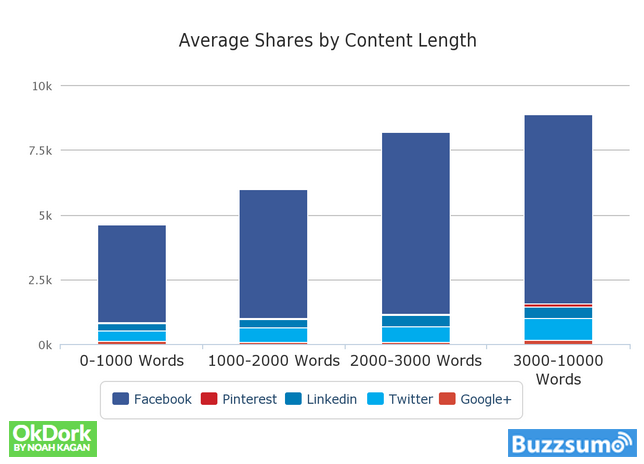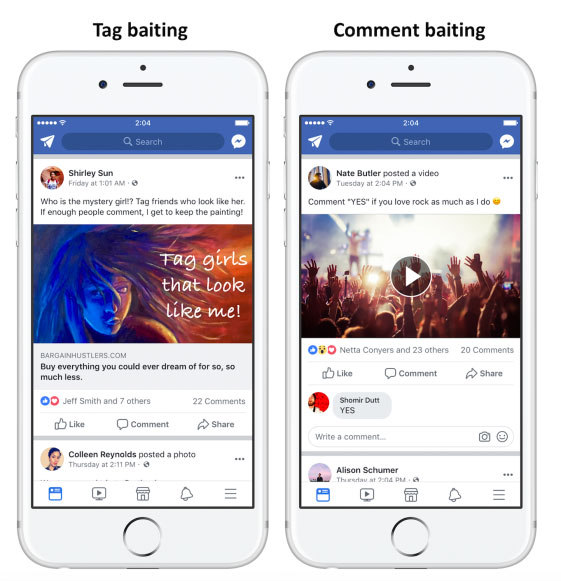We are in for yet another Facebook algorithm change. When Mark Zuckerberg announced that the platform would start prioritizing news feed content differently, it didn’t go down too well with marketers. Especially since he explicitly stated that “you’ll see less public content like posts from businesses, brands, and media” in favor of “meaningful conversations.”
What might sound good to private users, is worrisome to owners of Facebook pages. Will they still be able to get their content in front of their audience? Is it time to abandon Facebook as a marketing platform?
This very issue is the topic of this article. I will cover how the Facebook algorithm change in 2018 will influence how content ranks in the news feed. In addition to that, the post will give you concrete advice on how you can continue to get your content in front of your audience.
Just a small caveat: Nobody knows exactly what effects the changes will have as they roll out over the next few months. So, what follows are some educated guesses. Let’s get going.
Under the Hood of the Facebook Algorithm
When the average Facebook user logs into the platform, they have hundreds of updates waiting to populate their news feed. While in the past updates would appear in chronological order, for a few years now the Facebook algorithm has been deciding what you see in your feed.
Of course, the goal is to keep you engaged and on the platform. To decide which types of updates would best achieve that, Facebook uses different data points. Besides just looking at what’s available and who you are as a person, that also means examining the content itself. Here, it looks at things like:
- Average time spent on content
- Time of the posting
- Was the link shared by another person over messenger?
- Number of replies, comments, and likes
- Overall post engagement
- Publisher/brand post shared by a friend
- Type of posting
- How informative the post is
In the Future, It’s all About Activity
The new algorithm will put more emphasis on data points that show active interaction. That means comments, shares and reactions. On the other hand, passive interactions like clicking, watching a video or viewing/hovering over an image do not contribute to better rating.
Among the active interaction signals, we have the following hierarchy:
- Comments — Will be the new top currency on Facebook in 2018. Posts that generate a lot of (meaningful) comments and replies will move up in the news feed.
- Shares — The second most important ranking signal. Interactions with posts shared publicly (by friends on a timeline) or privately (via the messenger) will cause those posts to perform better.
- Reactions — The third important signal for active engagement.
In addition to the above, Facebook believes that personal posts are more valuable than those from brand pages.
What Does That Mean?
In short, the Facebook of the future wants to encourage people to talk to each other. The goal is to move from mere content consumption to real and meaningful engagement.
To achieve this, the platform will treat content that encourages this type of interaction favorably in the news feed. This is especially true for interactions between two people as opposed to between a person and a page.
For brands and pages that means, if they can foster these types of interactions, their content will perform better in the news feed. On the other hand, pages who put out content that usually doesn’t get reactions from followers will likely perform worse.
How can you avoid being among the latter? Let’s talk about that now.
Facebook Marketing After the 2018 Algorithm Update
As the new algorithm hits, brands and marketers need to shift from popularity and attention-driven content to content that creates substantial engagement. Here are some pointers on how to do that, plus additional tips on how to deal with the 2o18 Facebook algorithm upgrade.
1. Publish High-Quality Content
Quality and relevance should always be on the forefront of your Facebook strategy (or any content strategy). That’s just the price of admission. If what you share is shoddy or has nothing to do with the people you are trying to reach, it will have little to no effect.
Yet, the algorithm change will make focusing on quality even more important. Zuckerberg himself states that it will likely cause people to spend less time on the platform. Even if they are more engaged during that time, you better make sure that what you are publishing has the ability to stand out.

In addition to that, use all available tools to track the performance of your content. Have an eye on what works well and what doesn’t. It’s easier to make decisions about your content strategy that way.
2. Focus on Your Audience’s Needs
However, not just the quality will be important, the goal also matters. In order to adjust to the new Facebook algorithm, you will need to focus even more on the needs of your followers.
In order to create meaningful interactions, you need to share things that are meaningful to others. Only if they engage emotionally and personally will they feel the need to comment, share or interact with your content.

Of course, to be able to pull this off you need to have a deep understanding of your audience. Their challenges, struggles, fears, motivations – anything that gets them involved. Market research is a good starting point, however, it will also take a lot of testing.
3. Post Interaction-worthy Content
Since Facebook’s future is all about interaction, a good idea is to concentrate on types of content that have engagement built in. Those include:
- Questions — Facebook is a tool for many to get recommendations from and ask questions to their peers. Why not do the same with your followers? It can spark interesting discussions and will also help you understand them better.
- Timely, relevant topics — Post content on stuff that is going on right now. If it’s on a lot of other people’s minds, they are more likely to share their perspective and take part in the conversation.
- Videos and other visual content —Visual content, in general, is more engaging than mere text. Video especially takes the crown in terms of engagement. So if you can source or produce videos, go for it!
- Personal stories — You are not just a brand but also a person (or group of people). If Facebook aims to be about personal connection, why not get a little personal? Interact with followers more like you would with your friends and you are sure to make a more meaningful impact.
Aside from that, when an interaction unfolds, make sure to take part in it! Reply to comments, talk to your followers. It will keep the conversation going and also push your posts up in the news feeds.
4. Avoid “Engagement Bait”
We have all seen the types of posts like “tag a friend that looks like this in the morning” or “comment YES if you like burritos!”

They are a cheap ploy to get interactions and boost your posts’ visibility. However, they exist and people consider them viable options to game the new Facebook algorithm.
It’s basically the equivalent of keyword stuffing for web pages. It looks spammy, unprofessional and doesn’t add value to people’s lives. In short, you don’t want to engage in it. In addition to that, Facebook explicitly says that they will actively demote that kind of content.
5. Use Live Video
Live video is one of the most effective types of content on Facebook. It averages six times more interactions than regular video clips. Just watch BuzzFeed exploding a watermelon on live video, which was viewed more than 11 million times:
(function(d, s, id) { var js, fjs = d.getElementsByTagName(s)[0]; if (d.getElementById(id)) return; js = d.createElement(s); js.id = id; js.src = ‘https://connect.facebook.net/en_US/sdk.js#xfbml=1&version=v2.12’; fjs.parentNode.insertBefore(js, fjs);}(document, ‘script’, ‘facebook-jssdk’));
Watch us explode this watermelon one rubber band at a time!
Posted by BuzzFeed on Friday, April 8, 2016
Live video is also one of the few concrete mentions for content that will continue to perform well under the new Facebook algorithm. For that reason, it’s a good idea to consider it.
6. Encourage Your Audience to Follow Your Page
Even if organic reach will be harder to achieve, people who follow your page will continue to see your content in their news feed. That’s especially true if they set their news feed preferences to See First.

The consequence: actively ask customers, readers, website visitors and other potential audience members to follow your page. While you are at it, also remind them of the possibility to prioritize your content in their news feed with the aforementioned option.
7. Harness the Power of Facebook Groups
Facebook Groups are used by more than a billion people worldwide. For many, they are also one of the main reasons to be on Facebook.
As a consequence, groups represent the perfect way for building an audience and a community around your topic. People join them to have meaningful conversations, discuss issues and share their ideas and opinions.
Therefore, they are also a great place to share your content and talk with others about it. Whether you join an existing group or create your own, they are a good place to get started.
8. Embrace Paid Reach
Since organic reach for Facebook pages has been declining for a number of years, many have turned to paid ads to make up for it. With Facebook further de-prioritizing content from pages and brands, it might be time to get educated on how to use Facebook ads effectively.
Whether you employ them to supplement your organic efforts or ramp up existing paid campaigns, under the new Facebook algorithm it’s probably a good idea to brush up on your skills.
9. Branch Out to Other Platforms
Of course, it’s important to keep in mind that while Facebook might be the biggest fish in the pond, it’s not the only one. There are other platforms that can bring in qualified traffic.
So, if you find your Facebook reach declining in the next couple months, doubling down is not your only choice. Instead, you can also divert your effort towards YouTube, Twitters, Instagram, Pinterest, and other social media networks.
Plus, don’t forget your own website. While we rely on social networks to bring in additional traffic, it’s not the only way to do it. For example, you might also invest in SEO, mobile friendliness, and site performance to increase your organic traffic.
Additionally, find other ways to stay in touch with your visitors. Build an email list and consider technology like push notifications to keep them in the loop. In short, make sure your business will be fine without the use of Facebook.
The Facebook Algorithm Change 2018 in a Nutshell
The changes coming to Facebook’s algorithm have potentially serious consequences for marketers and owners of Facebook pages. The shift towards more personal interaction threatens to further decrease their reach on the social network.
However, by embracing the new realities, you can fortify your marketing efforts. Let’s quickly recap how to address the algorithm changes:
- Continue to focus on high-quality content
- Make your audience needs your priority
- Post content worth talking about
- Stay away from spammy engagement bait tactics
- Embrace live video
- Actively encourage your audience to follow your page
- Look into Facebook groups
- Consider paid reach
- Put more efforts into other marketing channels
Aside from that, it’s important to stay informed. As mentioned, changes will further unfold in the time to come and might call for additional course corrections. When that happens, you don’t want to be outside the loop.
How do you feel about the Facebook algorithm changes? How do they affect your Facebook strategy? Let us know in the comments section below!
The post The Facebook Algorithm Change 2018: What it Means for Your Marketing appeared first on Torque.
